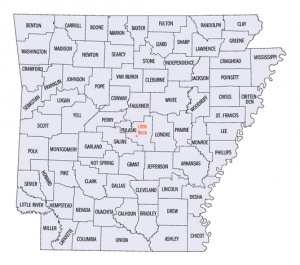[breadcrumb]
 Arkansas only has two known sites of naturally-occurring asbestos. These include the Hot Springs and Russellville areas. Arkansas has specific areas throughout the state that place individuals at an increased rate of exposure, such as where the mineral was imported, where mining occurred and where improper demolitions were completed.
Arkansas only has two known sites of naturally-occurring asbestos. These include the Hot Springs and Russellville areas. Arkansas has specific areas throughout the state that place individuals at an increased rate of exposure, such as where the mineral was imported, where mining occurred and where improper demolitions were completed.
Most people in Arkansas who have mesothelioma acquired it from exposure at work. Many industries used this product, once sought after for its heat and chemical-resistant properties. Industries that used this material were largely located in Little Rock, Pine Bluff, Jonesboro and Fayetteville.
People who worked in power plants are at an increased rate of developing mesothelioma. The largest power plant in Arkansas is Arkansas Power & Light. Asbestos was commonly used in insulation and other parts of these facilities because of the material’s resistance to electricity and heat. Oil refinery workers were also at an increased rate of exposure, which used the material for similar reasons. Additionally, air force bases like the Little Rock Air Force Base used asbestos in their buildings, so its possible veterans stationed in Arkansas were exposed.
Many manufacturers used asbestos in their products, including aluminum foil, lumber manufacturers and construction materials. The potential exposure related to these products depended largely on how often and closely workers were exposed to the dangerous mineral. Insulators, chemical plant workers, park staff, teachers, construction workers and demolition workers are at an increased risk of exposure.
If you have symptoms or have been diagnosed with an asbestos related disease such as mesothelioma contact our law firm today and learn about your legal rights, lawsuits, and claims.
Quick Links:
Arkansas Asbestos Regulatory Agencies
Arkansas Asbestos & Mesothelioma Diagnoses
Arkansas Laws Concerning Asbestos
Arkansas Statute Of Limitations
Arkansas Asbestos Trust Funds
Arkansas Mesothelioma Verdicts and Settlements
Arkansas Asbestos Exposure Site List
Arkansas Mesothelioma Law Firms
Arkansas Mesothelioma Diagnoses
Arkansas has a mesothelioma diagnosis rate of approximately 5 people per million. Between the years 1999 to 2015, 264 at least Arkansans were diagnosed with mesothelioma between the years 1999 to 2015. Between the years 1999 and 2013, a minimum of 203 Arkansas residents were diagnosed with asbestosis and another 968 were diagnosed with non-mesothelioma lung cancer.
Most mesothelioma diagnoses have occurred in the following Arkansas cities:
Little Rock | Fort Smith | Fayetteville | Springdale | Jonesboro | Conway | Rogers | Pine Bluff | Bentonvill | Benton
Sherwood – Texarkana – Russellville – Jacksonville – Bella Vista – Paragould – Cabot – West Memphis – Searcy – Van Buren – Bryant – El Dorado – Maumelle – Siloam Springs – Forrest City – Blytheville – Hot Springs Village – Harrison – Marion – Mountain Home – Centerton – Magnolia – Camden – Helena-West Helena – Malvern – Arkadelphia – Batesville – Hope – Monticello – Clarksville – Greenwood – Stuttgart – Lowell – Wynne – Beebe – Newport – East End – Osceola – Trumann – Heber Springs – Morrilton – De Queen – Farmington – Pocahontas
Arkansas Asbestos Laws
There are several asbestos laws in Arkansas that directly impact a plaintiff’s ability to recover compensation for the damages they sustained. There are also laws regulating the abatement and disposal of this dangerous material.
Statute of Limitations
The statute of limitations is the time limit that a person has to bring a particular claim. In Arkansas, the statute of limitations for a personal injury case is three years. This time limit also applies to wrongful death cases in which a person died from the condition caused by the negligent defendant. If the claim is not brought within this time limit, it can be barred.
Court Exposure Standard
Asbestos cases are typically brought in state courts. Each state has its own standards regarding the proof that is necessary to establish a claim. Arkansas has adopted the Lohrmann test. This requires showing that the particular named defendant in a lawsuit had such conduct that was a substantial factor in causing the injury or loss. A plaintiff may establish the proof necessary by showing the manner, proximity and frequency of exposure to asbestos. He or she may also present any additional mitigating or agitating factors. Arkansas caselaw has specifically rejected one-time exposure as possibly leading to such asbestos exposure that would provide a plaintiff with a cause of action against a defendant.
State Regulatory Agencies
Like with other states, there are federal agencies that have federal jurisdiction over the regulation of asbestos. The United States Environmental Protection Agency develops and enforces regulations that are necessary to protect the general public from exposure to airborne contaminants such as asbestos fibers that are known to be hazardous to people. Additionally, the Occupational Safety and Health Administration establishes and enforces regulations regarding asbestos exposure in the workplace.
On a state level, the Arkansas Department of Environmental Quality is responsible for the development of laws regarding the abatement and disposal of asbestos.
Arkansas Asbestos Regulations
 A person who demolishes, renovates or completes response activities involving asbestos-containing materials must be licensed or certified.
A person who demolishes, renovates or completes response activities involving asbestos-containing materials must be licensed or certified.
Before a contractor starts to demolish or renovate a project, he or she must inspect the affected facility or portion of the facility for the presence of asbestos. Additionally, he or she must develop a project design that involves a renovation or demolition of a building or project that contains asbestos. This design must be in writing and specific to the particular job. This project must be provided to representatives of the Arkansas Department of Environmental Quality upon request.
The contractor must provide a written notice of intent to the Arkansas Department of Environmental Quality within a certain number of days before commencing the project, which depends on the project. For demolition work, the notice must be provided at least 10 working days in advance. For renovation activity, the usual deadline is at least 10 days in advance. For planned renovation, the notice should be provided by December 21 before the upcoming calendar year. If there are emergency renovations, notice should be provided as soon as possible, but in any event, it must be provided by no later than the following work day after work begins.
Individuals and businesses are required to follow Regulation 21 for abatement procedures in Arkansas. This regulation contains the following definitions related to asbestos:
- “ACBM” or asbestos-containing building material – any friable and nonfriable asbestos containing material that is in or on interior structural members or other parts of a facility.
- “ACM” or asbestos-containing material – any material that contains more than one percent (1%) of friable and/or nonfriable asbestos material.
- “Asbestos-containing waste materials” – mill tailings or any waste that contains commercial asbestos and is generated by a source subject to the provisions of this regulation. This term includes filters from control devices, friable asbestos waste material, and bags or other similar packaging contaminated with commercial asbestos. As applied to demolition and 4-2 renovations operations, this term also includes regulated asbestos-containing
- “Category I nonfriable asbestos-containing material” – asbestos-containing packings, gaskets, resilient floor covering, and asphalt roofing products containing more than one percent (1%) asbestos as determined using the method specified in Appendix E, Subpart E, 40 CFR Part 763, Section 1, Polarized Light Microscopy.
- “Category II nonfriable asbestos-containing material” – any material, excluding category I nonfriable ACM, containing more than one percent (1%) asbestos as determined using the methods specified in Appendix E, Subpart E, 40 CFR Part 763, Section 1, Polarized Light Microscopy that, when dry, cannot be crumbled, pulverized, or reduced to powder by hand pressure.
- “Friable asbestos-containing building material (ACBM)” – any friable asbestos containing material that is in or on interior structural members or other parts of a school, public building, or commercial building.
- “Friable asbestos material” – any material containing more than one percent (1%) asbestos as determined by using the method specified in Appendix E, Subpart E, 40 CFR Part 763, Section 1, Polarized Light Microscopy that, when dry, can be crumbled, pulverized, or reduced to powder by hand pressure. If the asbestos content is less than 10% as determined by a method other than point counting by Polarized Light Microscopy (PLM), verify the asbestos content by point counting using PLM. The term includes nonfriable asbestos-containing material after such previously nonfriable material becomes damaged to the extent that when dry it may be crumbled, pulverized, or reduced to powder by hand pressure.
Asbestos Trust Funds
Asbestos trusts were established after many companies that manufactured asbestos were sued once employees or others connected their deadly diseases to asbestos exposure. Because of the significant legal exposure, many of these companies were forced to file bankruptcy or did so in order to reorganize their debts. Manufacturers and employers who were sued used Chapter 11 of the United States Bankruptcy Code Section 524(g) to establish such trusts. This allowed individuals who were named as a defendant in a personal injury, wrongful death or property-damage claim allegedly caused by the presence of or exposure to asbestos or an asbestos-containing product to set aside funds for claimant’s current and future damages.
While Arkansas does not have an asbestos trust fund that is currently administered in the state, an experienced mesothelioma lawyer can review the circumstances involved in your case to determine if a trust fund may be available. He or she can discuss the places where you lived, the places you worked and the types of job duties that were part of your various occupations. This information can help narrow down the type of asbestos-containing product that may have exposed you to a deadly disease. Your asbestos lawyer can then determine if a trust fund is available that can provide compensation to you without having to go through the entire process of filing a lawsuit against the responsible party.
Arkansas Asbestos Site Exposure List
Arkansas contains some job sites where asbestos was present. Some of these locations include:
Fort Chafee – Fort Chafee
Little Rock Air Force Base – Little Rock
University of Arkansas – Fayetteville
North Little Rock Parks – North Little Rock
Stuttgart School District – Stuttgart
Arkansas Electric Cooperative Corporation – Little Rock
Reynolds Metals – Bauxite, Arkadelphia and Malvern
Individuals can also be exposed to asbestos when companies do not properly follow asbestos abatement and disposal regulations.
Asbestos Litigation in Arkansas
Arkansas individuals who have been exposed to asbestos may file a lawsuit against a negligent employer or manufacturer. Lawsuits of this nature date back several decades ago and targeted manufacturers, employers and other negligent parties. Some of these cases resulted in companies filing bankruptcy since the dollar amounts of a single verdict can often be millions of dollars. Some Arkansans joined class action lawsuits in national cases. Some of these cases resulted in millions of dollars to plaintiffs while others resulted in more modest awards. Some cases may involve plaintiffs in Arkansas who were exposed at Arkansas job sites but the case is brought in another state. In one 2018 case reported in the media, a California jury awarded monumental dollar figure after finding the employer that operated water utilities in Arkansas, Arizona, Illinois, Missouri and Texas was negligent and caused asbestos exposure.
Many verdicts and settlements in Arkansas are kept private to protect the privacy of litigants or as part of the settlement agreement and these amounts are unknown.
Arkansas Mesothelioma Lawyers
A few lawyers across the state that specialize in asbestos cases and may serve as co-counsel. Mesothelioma lawyers typically take cases on a contingency fee basis, meaning that they do not charge fees upfront and only get paid if they are able to secure compensation through a verdict or settlement. A lawyer can discuss whether you may have a viable asbestos claim. Locations that our Mesothelioma lawyers will travel to in Arkansas include:
Texarkana, Sherwood, Jacksonville, Russellville, Bella Vista, West Memphis, Paragould, Cabot, Searcy, Van Buren, El Dorado, Maumelle, Bryant, Blytheville, Forrest City, Siloam Springs, Harrison, Hot Springs Village, Mountain Home, Marion, Helena-West Helena, Camden, Magnolia, Arkadelphia, Malvern, Batesville, Hope, Centerton, Monticello, Stuttgart, Clarksville, Greenwood, Wynne, Newport, Osceola, Lowell, Beebe, Trumann, Heber Springs, Morrilton, Pocahontas, De Queen, Warren, Farmington, Mena, White Hall, Crossett Alma



